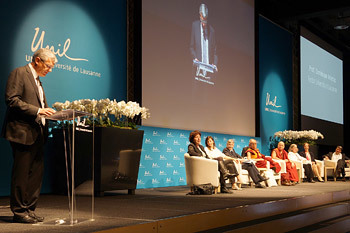Lausanne, Switzerland, 15 April 2013 - The University of Lausanne that originated in 1537 as a school of theology, the only French language Protestant school of theology, is now a modern university well regarded as a leading institution for research in Europe. It is located on the banks of Lake Geneva. Today, it invited His Holiness the Dalai Lama to participate in a conference on the theme ‘Living and Dying in Peace - Crossed Perspectives on Aging’. He was welcomed on arrival by the Rector, Dominique Arlettaz and the conference moderator Philippe Moreillon.
“I have the privilege today to welcome His Holiness the Dalai Lama and thank him for spending this day with us.”
Moderator Philippe Moreillon explained that when they heard that His Holiness would attend, faculty and staff members from many disciplines showed interest in participating. They have worked together to formulate common questions for the event that they felt they had been unable to answer within their own areas of study. The first question put to His Holiness imagined a young boy asking his grandfather “Is it a good thing to grow old?”
“I think it depends on what kind of life you have led, whether your life was meaningful and of benefit to other people. The grandfather might say time keeps moving on, eventually we all become old. One day, although you are young now, you will be old too. This is a natural process. He might say I’m fortunate to have lived this long, but I’ve not wasted my time and I’ve gained some experience of how to live.
“On the other hand, if he’s filled his time with sensory pursuits and dedicated himself, for example, to sport, he might say I can’t hear properly any more, can’t see properly - it’s all become hard work.”
The first presenter spoke about increasing life expectancy and different categories of older people, the ‘young old’ who are still active and the ‘old old’ who are increasingly frail. He asked: “How can we age well when our physical abilities are declining?” His Holiness answered that an important factor is your state of mind. Whether your mind is calm and peaceful depends not on your being knowledgeable, but on whether you are warm-hearted. Inner peace automatically gives rise to trust and friendship. On the other hand suspicion, mistrust and lies mean you end up alone and unhappy.
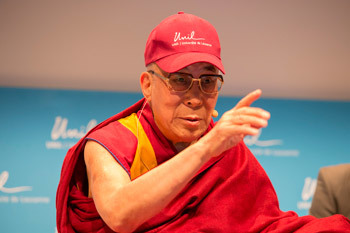
|
His Holiness the Dalai Lama gestures as he speaks at the conference on "Living and Dying in Peace" at the University of Lausanne in Lausanne, Switzerland, on April 15, 2013. Photo/Manuel Bauer
|
“From the individual’s point of view, if we train from a young age on a mental level, developing our analytical ability, the mind will remain alert. I’ve noticed that people who do this may face physical decline, but their minds remain clear and alert. From the family point of view, affection and support are important.”
Asked how to deal with dementia in the old, His Holiness replied:
“I don’t know, because I have no experience, but I believe showing affection is very important. You can show affection without having to rely on words.”
He speculated about how memory declines, noting that while you tend not to forget faces, remembering names is difficult and because of the concepts they represent there is terminology that you never forget. He wondered whether we forget names because they have no meaning, whereas terms with meaning are much easier to remember.
A question about spirituality prompted him to try to define the term, wondering if it means looking for meaning in life and the world; a collection of visions and values that are beneficial to ourselves and others. Because there could be spirituality linked to religious faith and independent of it, he suggested that people who have no faith might derive benefit from secular ethics. Otherwise, they are prone to come under the sway of destructive emotions. He stressed that just as it is wise to take care of our physical health, we also need to take care of our emotional well-being and proposed a programme of emotional hygiene.
The discussion came round to the role of the aging in society. His Holiness recollected a programme in Stockholm in which old people were brought in to work in kindergartens. They took part in the care of young children, played with them and told them stories. He said that there is great potential for mutual benefit in such activities. The children liked the presence of the old people, who in turn were re-energised in the presence of children. His Holiness joked:
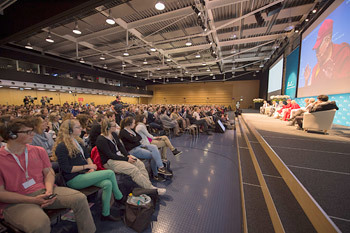
|
A view of the stage and audience during the conference on "Living and Dying in Peace" at the University of Lausanne in Lausanne, Switzerland, on April 15, 2013. Photo/Manuel Bauer
|
“When I talk to young people it makes me feel young, but when I’m talking to old people I wonder ‘Who’ll be going first, you or me?’”
His Holiness said that his discussions with scientists, educationists, social workers and other concerned people lead to the conclusion that we need a system of values that contributes to the basic happiness of all members of society. Such a system could include techniques for training the mind. Education is the avenue for change. Education is the way we can change the course of humanity. And he suggested that ancient Indian knowledge about the mind and emotions as preserved in literature belonging to the Nalanda tradition could make a valuable contribution to this.
When pressed to recommend ways that the elderly who have not trained themselves earlier in life could begin to change, His Holiness said he doubted that there was an effective method, pointing out that such methods need to be adopted when we are young.
After a leisurely lunch filled with conversation and discussion the conference resumed. Asked to respond to the statistic that a majority of people die in hospital His Holiness surprised the panel by saying that if you die in hospital it means that all efforts to save your life have been exhausted, so there will be no room for regret. On the other hand he agreed that doctors and nurses need to treat their patients as beings with feelings of pleasure and pain, rather than as inanimate machines brought in for repair.
Commenting on whether warm-heartedness is a natural function, he said:
“Yes, our lives begin in our mother’s womb and her physical touch and expression of affection are essential to our healthy growth. This is the basis for our later development of a warm heart.”
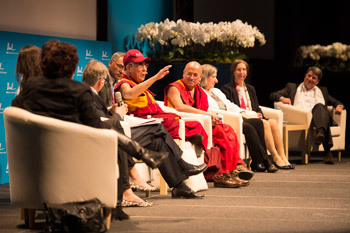
|
His Holiness the Dalai Lama speaking at the conference on "Living and Dying in Peace" at the University of Lausanne in Lausanne, Switzerland, on April 15, 2013. Photo/Manuel Bauer
|
To questions about helping the old or sick to die, he said we have to investigate why they wish to die. We have to use both compassion and wisdom to assess what is the best course of action. He said that in Buddhist practice helping to end someone’s life is permitted if it will benefit them in the long run, but again compassion and wisdom are needed to make the judgement.
He was asked whether it is important to train ourselves to meet death, and if so, how to do it.
“Death will come because it is a part of life,” he said. “People who avoid the very words old age and death will be caught unawares when it comes. In some of our meditation practice we visualize the process of death and the associated dissolution of the elements every day, so that we may be prepared for the actual event. For those who believe in a succession of lives, death is just like changing your body. If you have led a meaningful life, when death takes place there’ll be no need for regret.
“Training depends on the individual’s ability. One approach is to develop awareness of your dreams. If you can train yourself to recognise that you are in the dream state and take control of it, you can have a deeper experience of the dissolution of the elements that take place during the process of death.”
When it came to questions about rituals associated with death, His Holiness was firm in asserting his scepticism about the efficacy of rituals in the process. He conceded that if they were conducted by someone with experience and understanding they may have some benefit, but otherwise he doubted they would be of much help.
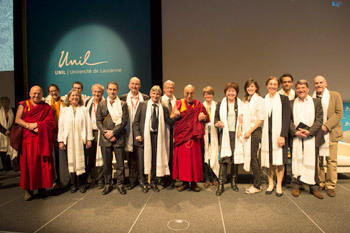
|
His Holiness the Dalai Lama with fellow participants after the conference on "Living and Dying in Peace" at the University of Lausanne in Lausanne, Switzerland, on April 15, 2013. Photo/Manuel Bauer
|
Coming back to the meditative practices that in effect rehearse the process of dying, he mentioned that he goes through them himself four of five times a day. In this connection he talked about meditators who remain in posthumous meditative equipoise after death. These are cases in which brain activity and the heart have ceased and yet the body remains fresh for several days. Over the last 50 years he is aware of 30-40 cases like this, including that of his Senior Tutor who stayed in such meditation for 13 days after he died. Science has as yet no explanation of this phenomenon, while the Buddhist explanation is that it involves the existence of subtler levels of consciousness. Although the heart, circulation and the brain have stopped, it is only when the subtle consciousness departs that the dying moment is reached and the decay of the corpse begins.
As the conference came to an end, the Rector offered words of thanks, expressing his gratitude to His Holiness for his understanding, his accessibility and his humour. He said it had been an honour to have his presence on the campus. He thanked both university staff and members of the Tibetan community whose hard work and support had contributed to the success of the event.
